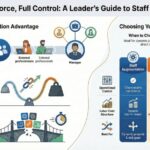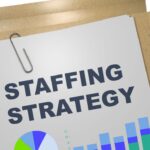Staff Outsourcing Solutions for Operational Stability
What staff outsourcing solutions actually mean in modern operations Staff outsourcing solutions refer to structured arrangements where external providers supply qualified labor to meet defined operational needs without transferring core business control. These...
Contingency Planning: Executive Readiness for Operational Disruption
What contingency planning actually means at the executive level Contingency planning is an executive discipline that defines how an organization will act when core operating assumptions break. The focus is not on predicting every possible disruption but on...
Warehouse Staffing Models for High-Volume Operations
What defines a warehouse staffing model in high-volume environments A warehouse staffing model defines how labor is structured, deployed, and adjusted to support throughput. In high-volume environments, the model determines whether operations remain stable under...
Staff Augmentation Solutions for Flexible Workforce Scaling
What staff augmentation solutions actually mean in practice Staff augmentation solutions are a workforce model that allows organizations to extend internal teams with external professionals who operate within existing structures and management. Unlike outsourcing,...
Staffing Solutions Agency – How Modern Workforce Models Actually Work
What a staffing solutions agency actually provides A staffing solutions agency supplies workforce capacity by sourcing, deploying, and managing labor in alignment with operational demand rather than fixed headcount assumptions. Unlike basic recruiting services, a...
Manufacturing Staffing Solutions for Reliable Workforce Scaling
Manufacturing staffing is the process of identifying, vetting, and deploying workers who can perform reliably in production environments under real operational conditions. It extends beyond filling open roles and focuses on workforce continuity, safety compliance, and...
What a material handler actually does in modern operations
A material handler manages the physical flow of goods so work can proceed without interruption. The role covers receiving, movement, staging, storage, and handoff of materials across warehouses, distribution centers, and production floors. When performed well,...
CNC machinists anchor modern manufacturing operations
CNC machinists are skilled manufacturing professionals responsible for transforming digital designs into precise physical components. Their work sits at the intersection of mechanical aptitude, programming logic, and process discipline, making them indispensable...
The Strategic Role of Contingent Staffing Solutions
Contingent staffing solutions give organizations structured access to non-permanent talent that supports agility, operational continuity, and cost discipline. Companies integrate contingent workers to meet variable demand, close skill gaps, and protect output during...
Crane Operator Responsibilities, Training Requirements, Safety Standards, and Workforce Readiness
Crane Operators Role Crane operators perform controlled, high-risk lifting work that supports construction, industrial production, energy development, transportation hubs, and large-scale infrastructure projects. Their ability to maneuver heavy loads with precision...







